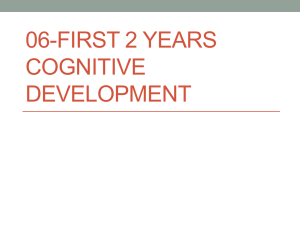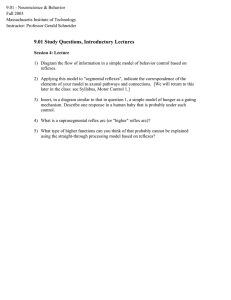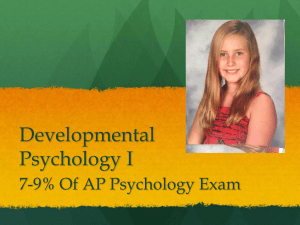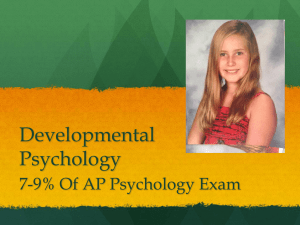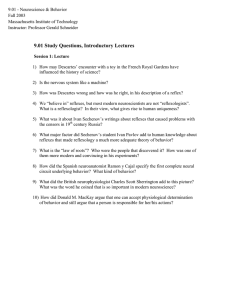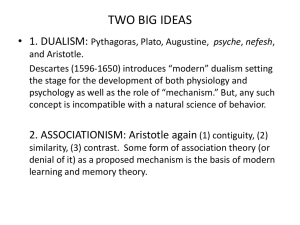FIRST 2 YEARS COGNITIVE DEVELOPMENT How does a baby & toddler begin thinking?
advertisement
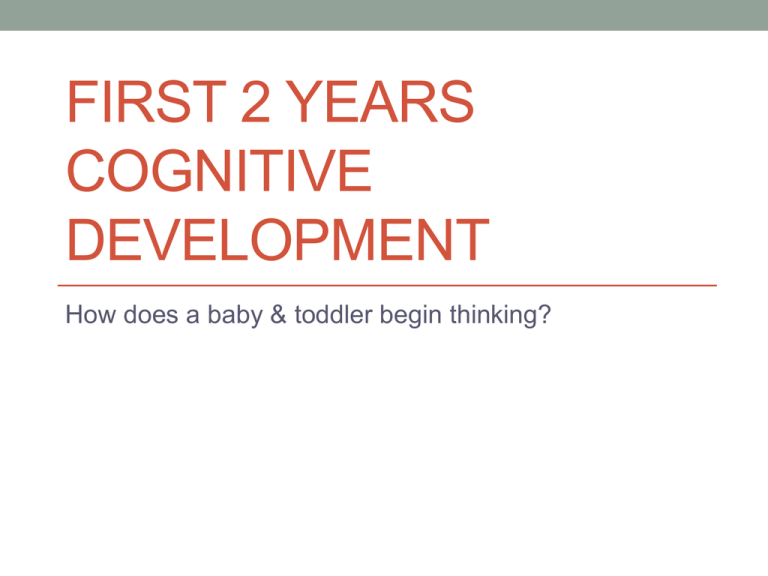
FIRST 2 YEARS COGNITIVE DEVELOPMENT How does a baby & toddler begin thinking? What are Piaget’s Stages of development? • Sensorimotor stage (Infancy) • Preoperational stage • Concrete operation stage • Formal operations stage (Adult) What is Piaget’s sensorimotor stage of cognitive development? • Primary reactions (Reflexes and habits) • Stage 1 (Birth – 1 month) • Reflexes • Stage 2 (1-4 months) • Adapting to new items (e.g. breast to pacifier) • Secondary reactions (Responds to other people) • Stage 3 (4-8 moths) • Making interesting interactions last • Stage 4 (8-12 months) • Anticipates interaction (e.g. putting Mother’s hands together to play) • Tertiary Reactions (Acts independently) • Stage 5 (1 – 1½ years) • “Little scientist” experimenting • Stage 6 ( 1½ - 2 years) • Considers consequences What is sensorimotor Intelligence? • Learned through the senses • Circular reaction • Sensation – perception – cognition cycle around and around Primary reaction • Stage 1 ( Reflexes) (Birth – one month) • Responding to own body (e.g. stepping reflex) • Stage 2 (Habits) (1-4 months) • Adapting reflexes to new situations • (Acquired adaptation) • E.g. Sucking from mom’s nipple to bottle to pacifier • A sign baby is thinking Secondary reaction • Responding to other people & objects • Stage 3 (Continuing interaction) • 4-8 months • Making interesting sights last • E.g. clapping hands for “patty-cake” • 8 Mos. Understanding object permanence • Stage 4 ( Starting interaction) • 8mos. – 1 year • Infant has goals • Initiates and anticipates • Initiates • E.g. Patty-cake • Anticipates • E.g. Running from an unwanted bath Tertiary reaction • Stage 5 (Acts independently - Experimenting) • 1-1½ years • Active experimenting • “Little scientist” • Stage 6 (Thought before action) • 1½ - 2 years • Thinks about consequences • E.g. Toilet overflowed last time • Mommy was mad at squeezing toothpaste • Deferred imitation • Copying behavior they saw earlier Do you remember? • What are the major differences between primary, secondary, and tertiary reactions? • What is the concept of “object permanence”? • At what level of reaction will children begin experimenting? • What is this behavior called? How do children process information? What are “affordances” • Opportunities to interact with people and things afforded by the environment • Visual Cliff • Based on experience • 6 month will go over cliff • 10 Month will refuse What do babies perceive? • Movement • Dynamic Perception • Infant focusing on the chasing things that move • E.g. A mobile spinning overhead, or a moving ball • People preference • Preference for looking at faces • Recognizing caregivers What types of memories do children have? • Implicit • Hidden • Unconscious habits, emotions, procedures • Crying • Learning to move mobile • Explicit • Usually verbal • Recalled on demand • Words, data, concepts • Reminders help Do you remember? • What is the visual cliff? • When will children refuse to cross it? • What is an example of dynamic perception? Language What is the universal sequence of learning language? • Reflexes, cooing, babbling, spoken words • All babies, regardless of native language follow this sequence • Listening & Responding • Babbling • E.g. ma-ma-ma, da-da-da • All babies, regardless of native language or deafness • Holophrase • One word = phrase • E.g. More, cookie, Dada! • Naming explosion • Nouns • Grammar What are the theories of language? • 1. Learning theory • 2. Social Pragmatic • 3. Innate • 4. Hybrid 1. Learning theory • Based on B.F. Skinner • Reinforcement • E.g. Parents talking to children 2. Social Pragmatic • Needed for communication • Parents • Outside world 3. Innate • Noam Chomsky • Children have an inborn ability to learn language • E.g. Grammar • Hypothesized a Language Acquisition Device (LAD) in the brain. • Enables universal inborn ability to learn language • Language in general is experience-expectant • Words are expected by the developing brain • Specific language is experience-dependent 4. Hybrid • Combination of the other three • Multiple cues contribute to learning language Do you remember? • What is the universal sequence of learning language? • What is an example of a holophrase? • What is the concept of the “Learning Acquisition Device” in the brain?
